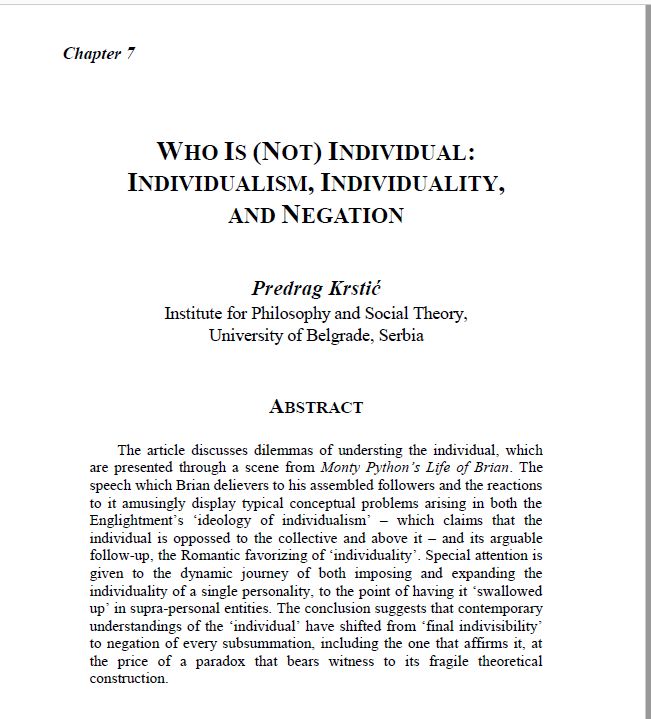Приказ основних података о документу
Who Is (Not) Individual: Individualism, Individuality, and Negation
| dc.contributor.editor | Jaworski, Jared A. | |
| dc.creator | Krstić, Predrag | |
| dc.date.accessioned | 2023-10-30T14:22:07Z | |
| dc.date.available | 2023-10-30T14:22:07Z | |
| dc.date.issued | 2020 | |
| dc.identifier.isbn | 978-1-53616-782-5 (ebook) | |
| dc.identifier.uri | http://rifdt.instifdt.bg.ac.rs/123456789/3072 | |
| dc.description.abstract | Relying on a scene from Monty Python's Life of Brian movie, the article would indicate the characteristically modern dilemmas in the understanding of the category of individual. The speech which Brian delivers to his assembled followers, and the reactions to it, amusingly display typical conceptual problems arising in both, the contemporary crucial and usually seen as conflicting, theoretical courses. The first part of the work presents the Enlightenment’s conception of "individualism", as the "ideology" that opposes and superposes the individual to the collective, and the second part exposes its ambiguous instalment in romantic favouritism of the "individuality." Special attention is thereby being paid to the path that is both forced uniqueness of individual personality and at the same time expanded it and drowned down in superpersonal entities. Thus it turns out that this trajectory of the historical move from “individualism“ to “collectivism“ is rather specific: the latter is reached not through direct, irreconcilable and unfruitful opposing the former as a “reciprocal concept“ – as in the case of some evergreen modern political alternative – but just the opposite, or so to speak, by means of forcing and tempting individualism, until it is comes to stand as its own opposition. In more detail, through advocating “individuality“ to a level of paroxysm, and through simultaneous justification of the particularization of precisely the otherwise universally individualistic nature of cultural entities, the “individual“ came full circle and restored power to its archenemy. The universalisation of particularity and certain radical "nominalism" of the life forms and the cultural creations introduced by Romanticism, however, suggest yet another conclusion: that the contemporary meaning of the „individual“ – even at the cost of the paradoxes, as in The Life of Brian, that testifies to its fragile theoretical construction – from the „last indivisibility“ moved towards the “singularity”, the negation of every (re)collection, including the one that, with the very conceptualization and affirmation, multiplies, levelled and reduced it. | |
| dc.language.iso | en | sr |
| dc.publisher | New York : Nova Science Publishers | sr |
| dc.rights | openAccess | sr |
| dc.source | Advances in Sociology Research | sr |
| dc.subject | Monty Python's Life of Brian | |
| dc.subject | individual | |
| dc.subject | individualism | |
| dc.subject | individuality | |
| dc.subject | Enlightenment | |
| dc.subject | Romanticism | |
| dc.title | Who Is (Not) Individual: Individualism, Individuality, and Negation | sr |
| dc.type | bookPart | sr |
| dc.rights.license | ARR | sr |
| dc.rights.holder | © 2020 Nova Science Publishers, Inc. | sr |
| dc.citation.volume | 29 | |
| dc.citation.spage | 173 | |
| dc.citation.epage | 195 | |
| dc.type.version | publishedVersion | sr |
| dc.identifier.fulltext | http://rifdt.instifdt.bg.ac.rs/bitstream/id/10593/Who_Is_Not_Individual.pdf | |
| dc.identifier.rcub | https://hdl.handle.net/21.15107/rcub_rifdt_3072 |

